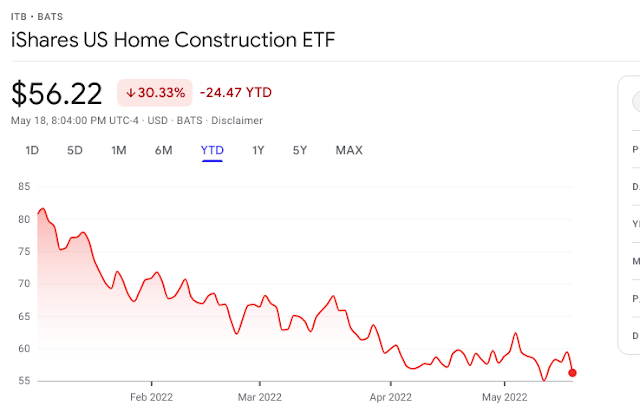Stock Markets: The Self-Organizing Fortune Tellers
The continual buying and selling of stocks on the NASDAQ and NYSE by specialists, which is done by traders in the pursuit of profit, is done to adjust the price of capital of firms to expected revenues to be produced by firms. The action of millions of traders results in the spontaneous organization of something that we call the stock market.
While no individual typically has the skill to predict future events, the spontaneously organized stock market can. It is by this that stock markets are known as discounting mechanisms. Stock markets adjust spot prices to reflect future business conditions. If stock markets did not do so, there would be no way to profit from owning stocks that would be sufficiently high enough to keep people from doing other things.
Thus, the stock market furnishes expert opinion as to the price of securities. This summed opinion lacks basis in business conditions right now. Instead, the collective opinion is a best estimate on future business conditions not yet known by the wider public. This discounting is the expression of group judgment rather than of individual judgment.
After all, to profit, one must sell higher than what one has paid. Today's spot price lets anyone buy future results at a discount, whether buying long for what should be a rising market or buying short in what should be a falling market.
ETFs as Indicators
Likely, ETFs are superior indicators to individual stocks since ETFs tend to be constructed from a bundle of stocks or contracts often that track indexes. Some stocks, however, tend to act as canaries in coal mines. When we take a few representative stocks from each industry, we can assume that not all are poorly run simultaneously when prices run alike in the same direction.
The Future of the Consumer
Retail
Residents of the USA (are there citizens anymore?) seem to be the drivers of the U.S. economy. Between 2000 and today, consumers are responsible for two-thirds of GDP.
If we would like to speculate upon the future state of the economy, we ought to bet on the expected future state of consumers?
Retailer ETFs and retailer stocks that might be our fortune tellers to the future that are telling us about where consumers will be in the months ahead. When the personal profit horizon gets worse for consumers, they spend less on luxury and other purchases that are not needed for survival.
Keep in mind, the current dollar quotations are irrelevant. Forever ongoing inflation, i.e., bank credit whether in bank notes or as book credits known as demand deposits, will forever distort current dollar quotations. What we should focus upon in the percentage change.
Also, most everything peaked at year end 2021 owing to massive quantitative easing between 2020 and 2022, which Federal Reserve central bankers have vowed to stop in 2022.
As you will see in the following charts, the expectation of the future is a smaller one as prices are down between one-third and two-fifths, roughly, year-to-date, which is a fairly good proxy for the peaks of stocks traded in the USA as most peaks were hit between late November and December of 2021.

Both retail and online retail are down significantly. ETFs and stocks like Amazon are telling us that consumers will have much less buying power in the months ahead.
Keep in mind that not only homeowners shop at Costco for bundles of toilet paper, but also small restaurateurs shop at Costco to supply their businesses. What the revenue distribution is between the two groups I know not. Either way, the future looks like Costco will earn less revenue even on higher prices.
Target sells small appliances and clothes, more or less. The expectation is that Target will sell less while selling what it sells on higher prices.
The Home Depot is where USA residents go buy major appliances, replacement windows and doors, garden supplies, battery-powered power tools and all kinds of replacement hardware for repairs.
The Emles Home Lifestyle Index focuses upon firms that sell products and services for home activities. The future appears to be one where persons spend less on goods and services that are not needed to survive.
Gambling is a kind of entertainment for many. The future looks like one where Americans will spend far less on entertaining themselves.
When the going gets tough, people spend less on luxury goods. Rising prices that rise faster than wages make people cut spending on pleasurable things so they can buy things that help them survive.
Cars and Trucks
The wisdom of the crowd appears to tell us that consumers will buy far fewer cars and trucks in the near future.
New Houses
It would appear that the sales of new houses will be fewer in the near future. Current mortgage rates are at recent highs hovering over 5.5% and rising.
Retirement Purchases: Stocks
Many would fail to look at it this way, but when wage earners have profits, i.e., when their wages exceed their cost of living expenditures, wage earners then can buy consumer discretionary goods or they can buy stocks, bonds, and the like.
KCE and IAI focus securities brokers and dealers, asset managers, online brokers, and securities or commodities exchanges.
Federal Reserve, Or, Who is to Blame
Since 2000, Fed Res central bankers have engaged in the most egregious interference in the USA economy with their Quantitative Easing. In the early years, the Fed Res bought up less than one trillion of US bonds and notes. Yet, since 2009, Fed Res bankers, in effort to mask an ongoing depression or what I call the Super Depression, have bought nearly $9 trillion in US notes, bonds as well as mortgage-backed securities.


















 Gab It
Gab It

